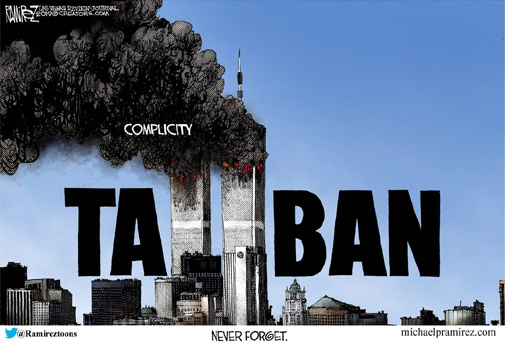As the nation memorializes the tragedy of September 11, 2001, it’s a very troubling coincidence that the Trump Administration – as indicated by the dismissal of National Security Advisor John Bolton yesterday – suddenly seems to be taking a new, kinder-gentler approach to Islamic terrorists.
As he has with many other staff and cabinet members, I suspect that the president may have had an ego issue and/or personality conflict with the former ambassador. Donald doesn’t always play well with others. And that’s a shame because John Bolton has far more experience than the president in international political machinations, and subsequently, a clear-eyed view of the evils facing America. He’s never been one to back down from tyranny, Islamist or otherwise. But he’s also not the warmonger critics are accusing him of being – he’s a realist.
Sen. Rand Paul and other hardline isolationists are applauding Bolton’s departure. They must be forgetting his predecessor, the feckless, globalist H.R. McMaster. And I’m not sure how they think ignoring obvious threats to world stability (Iran, Turkey, North Korea, the Taliban) is in America’s best interest. That approach didn’t work out real well for Europe when they tried to pretend Hitler was just an easily-appeased, minor inconvenience.
But now, here’s President Trump preparing to host the Taliban – THE TALIBAN – at Camp David for some sort of peace negotiations?! So you have to wonder, as Ben Shapiro is ~ Did We Learn the Lesson of 9/11? ~
With time comes forgetfulness. The same period of time has now elapsed since Sept. 11 that elapsed between the end of World War I (1918) and the German re-occupation of the Rhineland in contravention of the Treaty of Versailles (1936). Believing that World War I had ended all war, the Allied powers did nothing. That same year, Germany concluded its Axis alliance with Italy, as well as its Anti-Comintern Pact with Japan. Less than three years later, the world would be at war.
Forgetfulness is easy, because immediate costs are painful and steep. American foreign policy nearly always vacillates between two poles: isolationism and reactive interventionism. The American people (correctly) don’t like the consequences of isolationism — increased attacks on America and her allies, maximization of influence by our enemies — but we also dislike (correctly) the consequences of maintaining a global military presence […]
But every so often, we’re reminded that the world is filled with enemies.We were reminded of that unfortunate fact this week when President Trump withdrew an apparently secret invitation to the Taliban to visit Camp David. The Taliban was, is, and will remain an Islamic terror group; it has continuously sought the murder of American soldiers and citizens for two decades. Why would the Trump administration think it a good idea to sign an agreement with radicals who seek to overthrow the administration of Afghanistan, support terrorism and despise the United States? Do members of the administration truly believe that any agreement signed by the Taliban will be binding? […]
The problem, of course, is that there are no easy solutions when it comes to foreign policy in the worst parts of the world. Everyone of good heart wants American soldiers out of Afghanistan and home. But how many Americans are willing to risk the increase in terrorism likely to follow such a withdrawal?
Let’s hope that Bolton’s departure is just another ego incompatibility issue, and that it doesn’t signal an ominous change in our foreign policy direction. The Trump Doctrine was winning.
~~~~~~~~~~~
Related:
Ted Cruz: John Bolton ouster may signal ‘deep state forces’ winning fight to salvage Obama Iran deal ~
“I sincerely hope his leaving the White House does not mean that the deep-state forces at State and Treasury—who have been fighting tooth and nail to preserve the Obama Iran nuclear deal—have finally convinced the president to go soft on Iran,” the Texas Republican said.
“Relaxing the maximum pressure strategy, which is succeeding in dramatically weakening the world’s leading state sponsor of terror, would be an enormous mistake,” he added […]
Tehran interpreted Bolton’s departure as a sign Washington was losing its nerve. “The marginalization and subsequent elimination of Bolton is not an accident but a decisive sign of the failure of the U.S. maximum pressure strategy in the face of the constructive resistance of Iran,” Hesameddin Ashena, an adviser to Iranian President Hassan Rouhani, tweeted.





